1990s
Barfo Family Candy
The classic, vomiting-head candy released by Topps in 1990.Drew Friedman tells the story of its creation here.



Posted By: Alex - Wed Jul 18, 2018 -
Comments (1)
Category: Candy, 1990s
Miss Interplanetary Space Queen of 1997
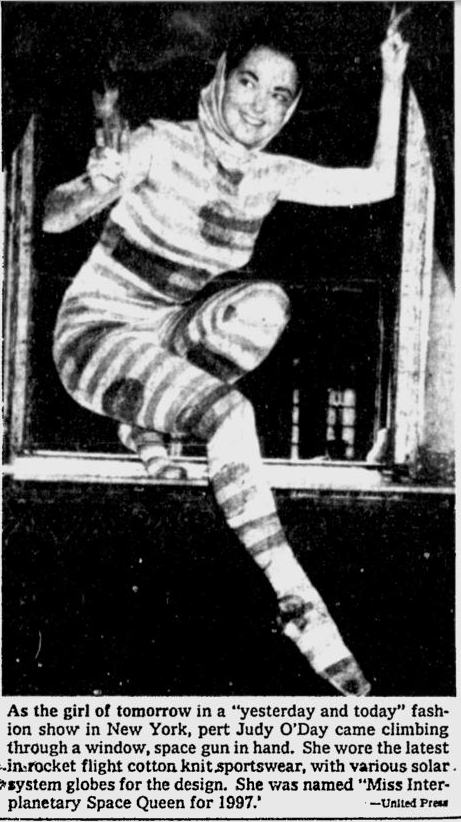
Source.

Posted By: Paul - Wed Jul 18, 2018 -
Comments (3)
Category: Beauty, Ugliness and Other Aesthetic Issues, 1950s, 1990s, Yesterday’s Tomorrows
Donut Cologne
Invented in 1996 by three California firefighters turned entrepreneurs. Their explanation of how they got the idea:More info: LA Times - May 3, 1996


San Bernardino County Sun - Aug 7, 1996
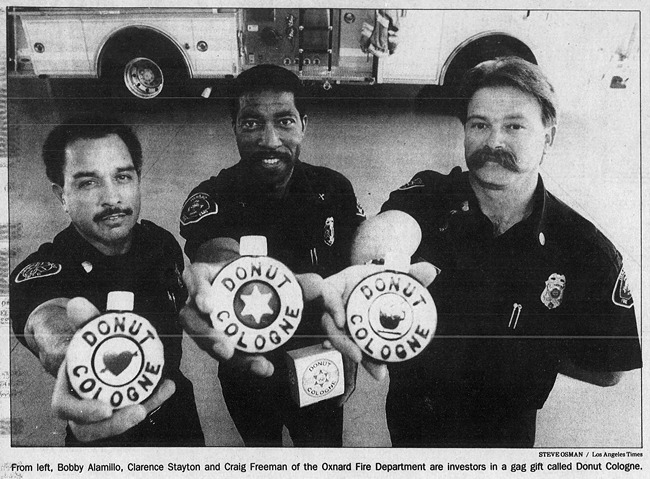
Los Angeles Times - May 3, 1996
Posted By: Alex - Thu Jul 12, 2018 -
Comments (2)
Category: 1990s, Perfume and Cologne and Other Scents
Returned for insufficient payment
October 1992: Evans Mortuary played hardball. When a customer didn't make full payment, they simply returned the body, right to the customer's doorstep. More details here, including these lines:And from the mortician:
The mortician was charged with abuse of a corpse, but eventually acquitted.

Salem Statesman Journal - Oct 14, 1992
Posted By: Alex - Sun Jul 01, 2018 -
Comments (3)
Category: Death, 1990s
Follies of the Madmen #368
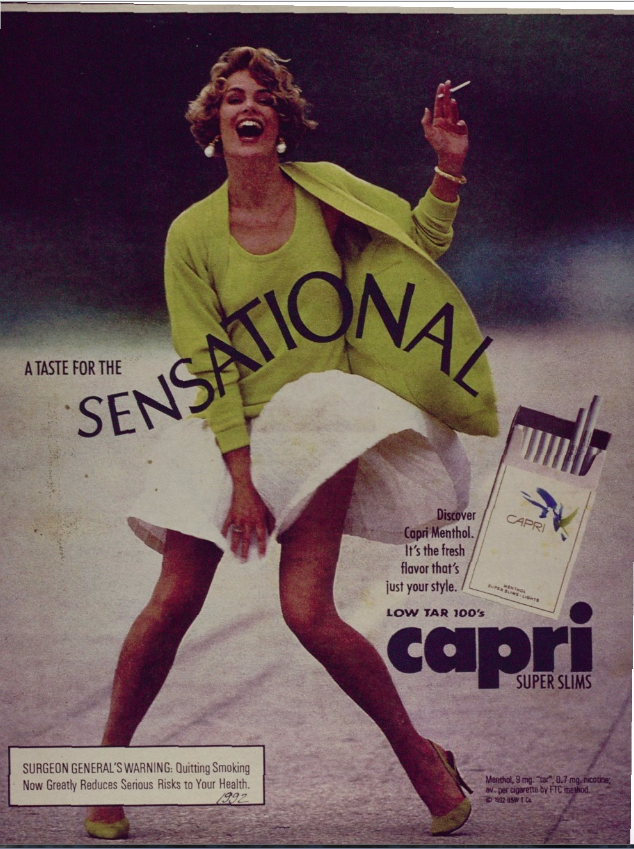
Cigarettes tied to alarming increase in skirt flareups!
Original ad here.
Posted By: Paul - Sat Jun 09, 2018 -
Comments (2)
Category: Business, Advertising, Tobacco and Smoking, 1990s
Mistress of Time
Back in 1996, Jeanne Calment of France celebrated her 121st birthday by releasing a record titled Maîtresse du Temps (Mistress of Time) on which she "recounts her memories above a musical background of rap, techno and farandole, a regional dance tune dating to the Middle Ages."Based on the clips I've been able to find, the album was as awful as you might expect.
Calment died in 1997, at the age of 122. Wkipedia offers this interesting detail about her life:

Salem Statesman Journal - Feb 22, 1996

Posted By: Alex - Thu Apr 26, 2018 -
Comments (0)
Category: Music, 1990s
Feral Cheryl
An eco-feminist, anti-Barbie doll featuring tattoos, unshaven legs, pierced nipples, pubic hair, and dreadlocks. Created by Lee Duncan of Australia in 1995.Duncan still has a few Feral Cheryls available for sale at her website feralcheryl.com.au. They're going for $75 AUD (about 57 US dollars).

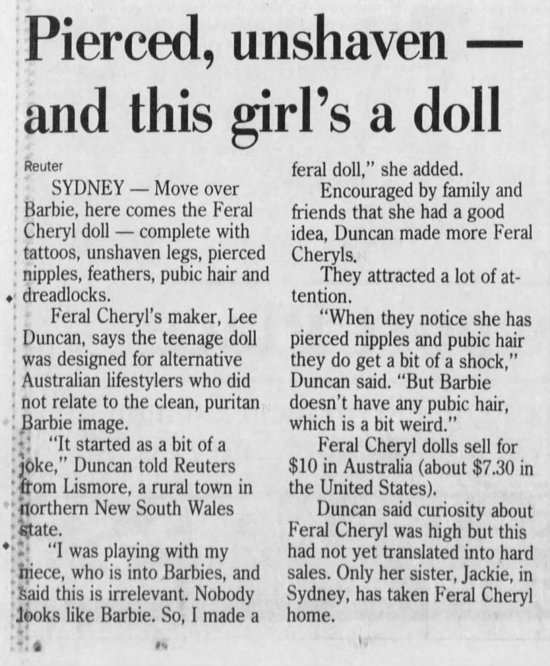
Palm Beach Post - May 31, 1995
Posted By: Alex - Mon Apr 23, 2018 -
Comments (3)
Category: Toys, Gender, 1990s
Dog-Fur Boots
Tecnica is still around, and still selling boots. But none lined with dog fur any more, as far as I can tell.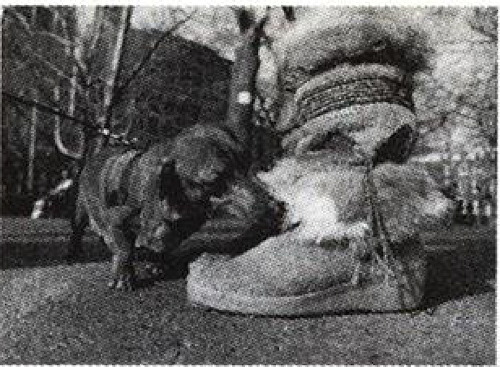

Greenville News - Dec 11, 1991
Posted By: Alex - Sun Apr 22, 2018 -
Comments (5)
Category: Fashion, Shoes, Dogs, 1990s
Have an airport nice day
In 1991, the New York Port Authority launched a $90,000 program to teach its employees to be friendlier to tourists. As part of this program employees "were encouraged to repeat the following mantra as a send-off to visitors: 'Thank you. Have an airport nice day.'"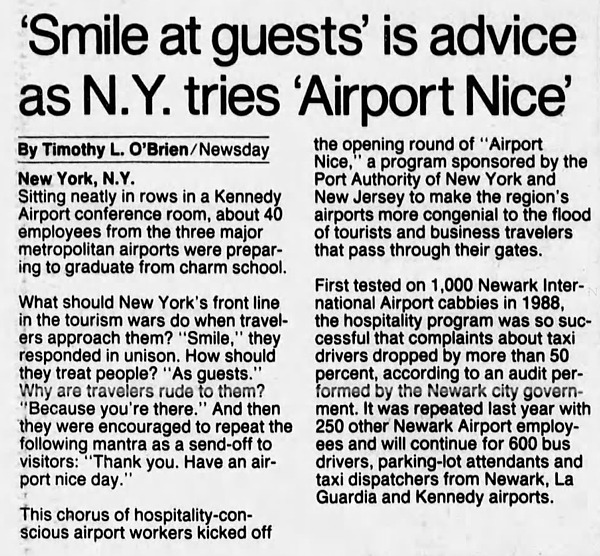
Minneapolis Star Tribune - Aug 12, 1991
Posted By: Alex - Thu Apr 19, 2018 -
Comments (2)
Category: Bombast, Bloviation and Pretentiousness, 1990s
Inflatable Underpants
I wonder where Katsuo Katugoru was during the big 2011 tsunami... if he got a chance to use his invention.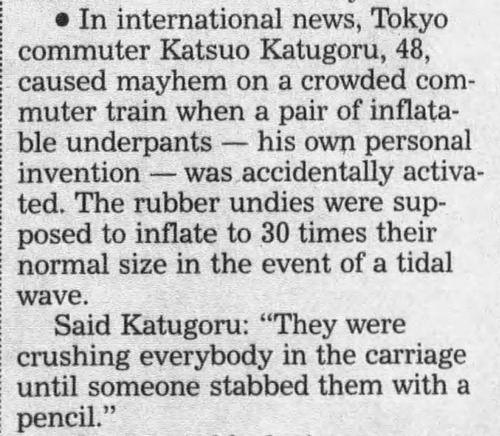
Orlando Sentinel - Aug 23, 1998
Update: I've concluded that Katsuo's inflatable underpants were fake news. Never happened. Columnist Mark Gibbs called it out as such in his May 4, 1998 column in Network World magazine. He also offered some prescient thoughts about the emergence and possible consequences of the fake-news phenomenon:
— Unsubstantiated story carried March 3, 1998, by London's Daily Telegraph, National Public Radio and many other serious news organizations.
What's interesting about this story (other than the weirdness) is the coverage the story received. According to some reports, The Associated Press sourced it, but no one has been able to find any AP reference. You have to wonder how the likes of NPR and the Daily Telegraph could run with it.
What the event illustrates is a phenomenon that will become increasingly common — the Internet raising gossip, jokes and misinformation to the status of truth. This is what I call "anti-data." Anti-data is not the opposite of data, rather it is the stuff that dilutes and invalidates the data you need.
Part of the reason anti-data exists is because the Internet supports the rapid transfer of huge amounts of what we'll call, for the sake of argument, "news." Way back in 1967, Marshall McLuhan noted the consequence of speedy news delivery as a general trend of modern media in "The Medium is the Message: An Inventory of Effects," (p. 63):
Information pours upon us, instantaneously and continuously. As soon as information is acquired, it is very rapidly replaced by still newer information. Our electrically configured world has forced us to move from the habit of data classification to the mode of pattern recognition.
The Internet amplifies this effect and applies it not only to news but also to intelligence about markets, people and business concerns in general.
To corporations, this should be a great concern. As your employees begin to rely on pattern recognition over data analysis, generally their judgment will become less consistent.
Their correct conclusions may well become more accurate, but their wrong ones will tend toward the catastrophic. These extremes might average the same as prior judgments, but the fact that the highs are stellar and the lows, abysmal, will induce chaotic behavior.
Posted By: Alex - Tue Apr 17, 2018 -
Comments (5)
Category: Inventions, Underwear, 1990s

| Who We Are |
|---|
| Alex Boese Alex is the creator and curator of the Museum of Hoaxes. He's also the author of various weird, non-fiction, science-themed books such as Elephants on Acid and Psychedelic Apes. Paul Di Filippo Paul has been paid to put weird ideas into fictional form for over thirty years, in his career as a noted science fiction writer. He has recently begun blogging on many curious topics with three fellow writers at The Inferior 4+1. Contact Us |




